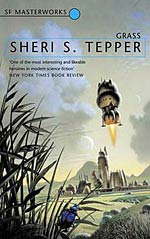
![]() Triseult
Triseult
10/10/2012
![]()
Some reviewers have called this book "social SF", and I feel this label is a disservice to what SF should aspire to be. Yes, it features very intricate social bonds and relationships, but isn't that what SF should always do? Good SF shows us how a society twists and bends when some fantastical pressures are applied, and the resulting is social. Dune was political, but also social SF.
In Grass, the social intricacies are multi-layered. The first half of the novel concerns itself--brilliantly, I might add--with the social ramifications of various forms of social and cultural shocks. There's the culture shock between the Ambassador and the Bons, deadly and intricate, filled with diplomatic dances and double meanings. There's the contrast between the Commons, the Bons, and the Green Brothers, all sharing a world, but playing very different roles on it. There's the huge culture shock between Humanity and the alien Hippae, an appealing mystery to unravel. And on a more intimate level, we get to see Rigo and Marjorie, the Ambassador and his wife, as their posting on the planet Grass threatens to unravel their relationship and drag their children along.
The first half of the book, concerned with the above intertwinings, is downnright brilliant. The mystery of the Hippae is grandiose, and Grass is both parochial, deadly, and enticing. The Hunt is something new and unique in SF, and the characters all feel complex, strong, infuriatingly blind, clever, and engaging all at once.
Once the action gets into high gear, though, it feels as if the tapestry unravels quickly. Characters who once had complex motivations and psyches get reduced to simpler action vectors. They begin to make decisions that serve mostly to carry the plot in the right direction. The weakest example of this is how Mainoa falls asleep at random when the plot requires he should not be present. A lot of the second half feels a bit too disheveled and furious. The action feels almost out of place after the diplomatic subtleties of the first half.
Although these points make Grass miss perfection, they don't deter from a solid SF novel in its own right. Although I cared little for the ultimate revelations the book had to offer about the Foxen, the Hippae, and the Plague, I cared a lot for the main characters. Marjorie is a fantastic character. She's complex, flawed, engaging, charming, infuriating, naive, smart, and wise all at once. Although her husband Rigo tends to fall into antagonistic pathology, their relationship is both sad, realistic, and poignant. I particularly appreciated how Marjorie was depicted as a fervent Catholic, wracked with guilt and dedication, yet her faith never makes her predictably naive or foolish.
Another strong point of the story was the role of horses in the tale. Ms. Tepper visibly knew a lot about horse personalities and character traits, and it really shines in Grass. They're believeable characters in their own right, and the many details of Marjorie's relationship to the horses in her stable was touching and engaging.
If the book had continued with the pace, complexity and nuance of the first half, it would have easily ranked five stars. But although the story falters in the second half, the characters still shine their way through to a solid, memorable SF story.